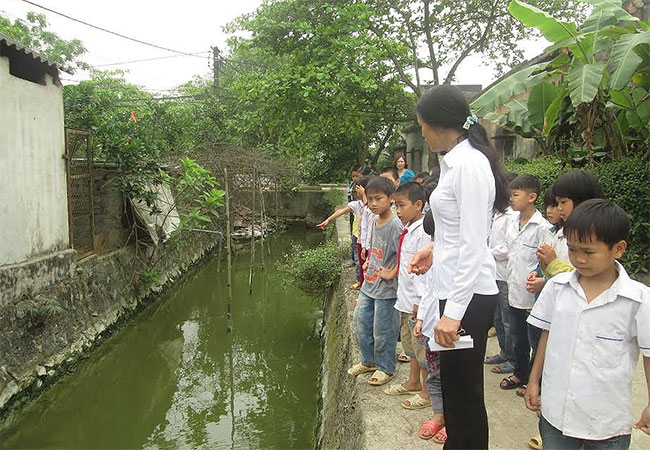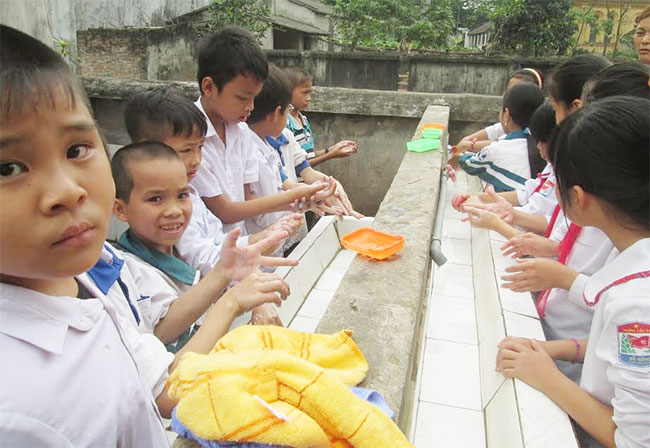Over 1,600 Hanoi pupils educated to promote awareness on water conservation

The project is funded by Suntory Holdings Limited (SHD) Japan and conducted by Suntory PepsiCo Vietnam Beverage (SPVB) in coordination with local authorities, schools and Live and Learn.
SPVB is a strategic beverage alliance between PepsiCo Inc., one of the world’s largest food and beverage companies, and Suntory Holdings Limited (Suntory), a global beverage and wellness company based in Japan.
The project has received positive response from participating teachers and pupils so far, which reveals project growth potential.
Since its launching in March 2015, pupils have been engaged in the first two parts of the project. The first part was taught by experts from the Live and Learn and pupils had a chance to learn about water resources in the nature as well as the vital role of water in human life and importance of water resource protection through a series of interactive activities.
In the second part of the project, local teachers were trained to deliver the lesson and organise useful and interesting outdoor activities related to water resources.

About 1,500 water diaries (workbook for pupils), 1,000 picture books “Water is a gift”, telling the importance of the water in the environment, and 500 teaching documents have also been handed over to teachers and pupils at the six piloted school to preserve the continuity of this water education programme. It is also the sustainable goal of the project as planned from the very first beginning.
All project lessons applied an interactive teaching method incorporating several activities such as relay game, group discussion, drawing pupils’ homeland river and telling the story about how the river is polluted, and more. As a result, pupils’ activeness and desire to explore and learn more were strongly encouraged.
Appraising the project efficiency, Nguyen Thi Loan, principal of Do Dong Elementary School said, “Participating teachers are highly interested in this new teaching method since we recognise that pupils are more active and happier during the whole lesson. We wish to be further trained and practice teaching with this new method in the future.”
“In my opinion, the project has made a considerable contribution in improving pupils’ awareness and developing habits in protecting water resources and environment through their daily actions at schools,” Loan added.
In the summer of 2015, Mizuiku project deployed the renovation of school infrastructures, school rest rooms and installation of water facilities at those schools facing water pollution. The sanitary installation, water facilities and rest rooms have been well finished to be ready for the new school year of 2015-2016.
In order to encourage pupils to learn intensively and actively, the project will also include a factory tour to Suntory PepsiCo Vietnam’s factory in Bac Ninh, about 30km from Hanoi, in order to make students know how the factory engages in wastewater treatment, water saving and launching a drawing contest as well as initiatives to protect pupils’ homeland river.
Takenobu Shiina, senior general manager, Planning Department, Corporate Communication Division of Suntory Holdings Limited said, “After six months of implementation, we are happy with project deliverables. We expect the project to produce desired results as it does in Japan and exert positive impacts on Vietnam’s elementary pupils’ awareness - future protectors of the country environment, contributing sustainably to the development of the community.”
Mizuiku is a water education programme that has been successfully deployed in Japan since 2004 by Suntory Group. Vietnam is the first country other than Japan having this project deployed.
What the stars mean:
★ Poor ★ ★ Promising ★★★ Good ★★★★ Very good ★★★★★ Exceptional
Latest News
More News
- 14th National Party Congress wraps up with success (January 25, 2026 | 09:49)
- Congratulations from VFF Central Committee's int’l partners to 14th National Party Congress (January 25, 2026 | 09:46)
- List of newly-elected members of 14th Political Bureau announced (January 23, 2026 | 16:27)
- 14th Party Central Committee unanimously elects To Lam as General Secretary (January 23, 2026 | 16:22)
- List of members of 14th Party Central Committee announced (January 23, 2026 | 09:12)
- Highlights of fourth working day of 14th National Party Congress (January 23, 2026 | 09:06)
- Press provides timely, accurate coverage of 14th National Party Congress (January 22, 2026 | 09:49)
- Press release on second working day of 14th National Party Congress (January 22, 2026 | 09:19)
- Minister sets out key directions to promote intrinsic strength of Vietnamese culture (January 22, 2026 | 09:16)
- 14th National Party Congress: Renewed momentum for OVs to contribute to homeland (January 21, 2026 | 09:49)
















 Mobile Version
Mobile Version